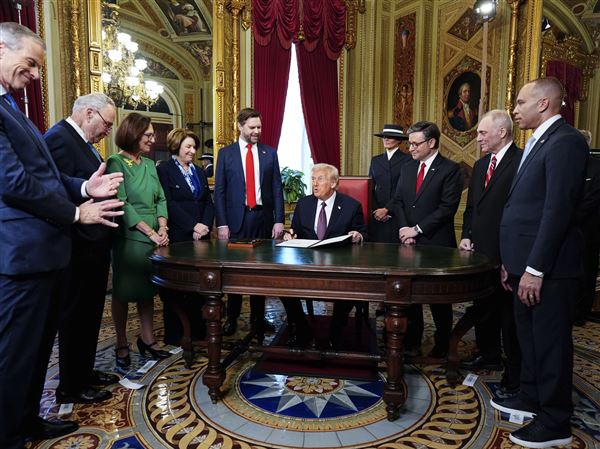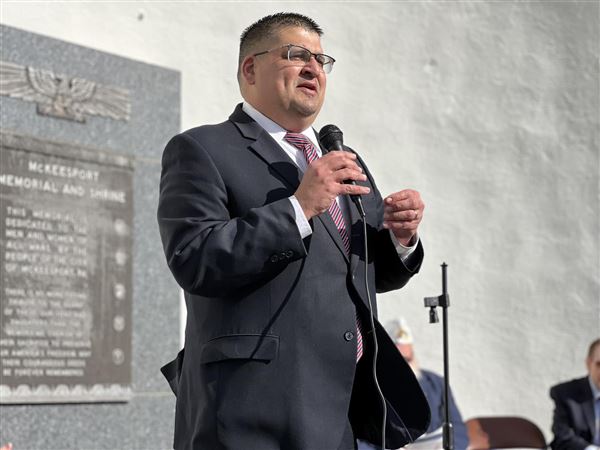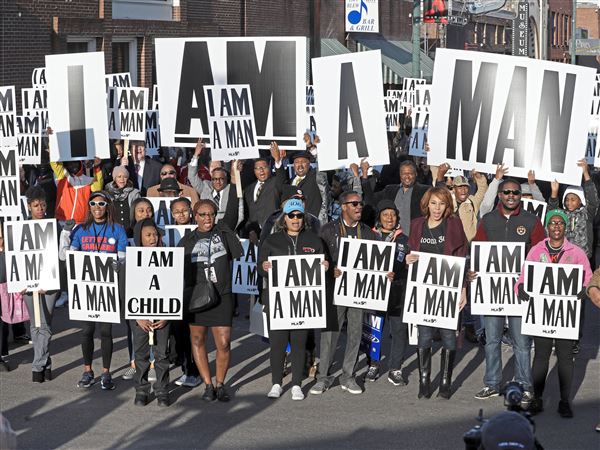WASHINGTON -- Lawmakers have families, too, and when issues come before them that affect those families, they're often conflicted.
Just ask Sen. Joe Manchin, D-W.Va., who opposes corporate tax inversions even as Mylan, the pharmaceutical company where his daughter Heather Bresch is CEO, is using them to lessen its tax burden.
Or try to ask him anyway. Mr. Manchin, through a spokesman, declined to comment for this story.
However, Mr. Manchin has said publicly that he would gladly support legislation outlawing the inversion loophole that firms such as Mylan are using to reduce their tax burdens by incorporating overseas.
"Inversion should be absolutely repealed," Mr. Manchin recently told National Journal reporter Ron Fournier. "All of them. Get 'em all, Ron. Get 'em all."
All of 'em ostensibly includes his own daughter, and that has some observers in Washington envisioning tense Manchin family gatherings.
Others say such tough talk doesn't really amount to much since there is little chance Mr. Manchin will have to cast a meaningful vote.
"It's not as if Congress is actually going to adopt this measure. It's symbolic more than anything else. It's not like he's going to have to go home and explain at dinner why he's voting against his daughter's interests," said Bill Allison, editorial director of the Sunlight Foundation.
Votes that advance relatives' interests raise more concerns, as they should, Mr. Allison said, noting several instances worthy of scrutiny.
There's Rep. John D. Dingell Jr., D-Mich., who consistently opposed stricter regulations for the auto industry and supported its 2009 federal bailout. His wife was a General Motors executive and a descendant of the family that founded Fisher Body, an early part of General Motors.
In Pennsylvania, there is Rep. Mike Kelly, R-Butler, who supported legislation favorable to shale drillers while his wife, Victoria, owned at least $1.5 million in shares of two gas companies her great-great-grandfather founded.
Both have said their votes were not motivated by personal gain but by the need to keep Americans employed and to help the national economy by supporting industries that are the backbone of their districts.
Lawmakers widely agree that something must be done to keep American companies from headquartering overseas, but ideological approaches vary.
Democrats want to dissuade offshoring by prohibiting the awarding of federal contracts to overseas companies with at least 50 percent U.S. ownership.
"We ought to put a stop to all inversions, but at the very least, we should stop these companies from receiving federal funding," Sen. Carl Levin, D-Mich., said in a written statement on inversions last week.
Republicans, meanwhile, see inversions as a symptom, not a cause. They want to reduce the corporate tax rate for all companies in order to keep American businesses, and their investments, at home. They're looking for comprehensive tax reform, not a piecemeal approach that addresses inversions separately.
With no action imminent, Mr. Manchin really has nothing to lose personally or politically by taking a stand against the strategy of his daughter's company, Mr. Allison said.
Two spokespeople from Mylan did not respond to interview requests.
Political scientist G. Terry Madonna, meanwhile, said Mr. Manchin's support of outlawing inversions is about political perception, not ethics, particularly since his position hurts, not helps, his daughter.
"He's reacting in a way that's fairly predictable," said Mr. Madonna of Franklin & Marshall College. "He comes from a coal state that's heavily committed to certain kinds of industry -- obvious coal -- but he's one of the few moderate Democrats left, so he's got to be very careful. He has to stay on safe ground with the industries in his state."
In this case, he can easily do that because Mylan is across the state border in Canonsburg, and its employees are not constituents.
The political calculation comes down to the average voter, Mr. Madonna said, and most voters in West Virginia aren't concerned with a Pittsburgh pharmaceutical company.
What troubles watchdogs such as Mr. Allison is that many other lawmakers have similarly situated relatives in lower profile jobs that haven't been scrutinized because the public doesn't know about them. Ethics rules require federal lawmakers to disclose their own financial assets and their spouses' and minor children's but not those of other relatives.
Legistorm and the Citizens for Responsibility and Ethics teamed up on a 2012 study of the ways lawmakers' work benefits their families. They identified 248 members as having used their position to help relatives, including 44 whose relatives are lobbyists.
The report does not mention Mr. Manchin or Ms. Bresch, whose work appears not to meet the threshold that triggers a requirement to register as a lobbyist. Still, Ms. Bresch has said publicly that she has spent time on Capitol Hill pressing for tax reforms that would have kept Mylan headquartered in the U.S.
Separately, in 2012, The Washington Post identified 73 members of Congress who sponsored or co-sponsored bills benefiting businesses and industries in which either they or their relatives worked. The practice is legal and allowed under rules of ethics.
Mr. Allison said lawmakers should be required to disclose that information themselves and that it should be easily accessible to the public in a comprehensive database.
"There's no requirement to disclose, and that's deeply disturbing," Mr. Allison said. "At least people should know where the conflicts are."
First Published: August 4, 2014, 4:00 a.m.

















